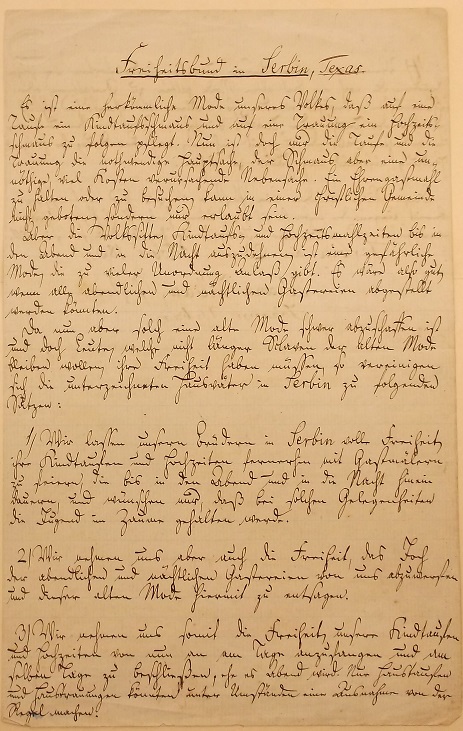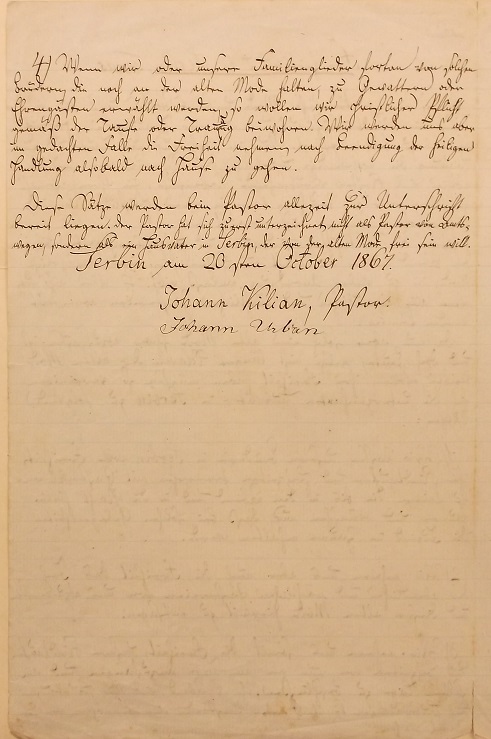Freedom Covenant in Serbin, Texas
It is a local custom of our people that after a baptism a child baptism feast, and after weddings a wedding feast to follow is practiced. Now, only
the baptism and the wedding ceremony is the most necessary main thing, but the feast however, which is expensive, is an extra matter. To have or to
visit an honorary guest meal in a Christian congregation cannot be commanded, but only allowed.
But the folk custom at child baptisms or wedding meals that last into the evening and into the night is a dangerous custom, which can lead to much
disorder. It would be good that all evening and night celebrations could be given up.
But such an old custom would be hard to give up. So that those who would no longer want to stay with the old custom, would be given their freedom,
the undersigned house fathers in Serbin commit themselves to the following statements:
1) We give our brothers in Serbin the full freedom from now on to celebrate their baptisms and weddings with guest meals that would last into the
evening and into the night, and only wish that at such occasions the youth would be kept under control.
2) But we also take for ourselves the freedom to throw off the yoke of the evening and nighttime celebrations, and thereby to reject this old custom.
3) We thereby use our freedom from now on to begin our baptisms and weddings during the day, and close them on the same day, before it gets to be
night. The only exception to this rule would be the house baptisms and house weddings.
4) If we, or members of our family are invited to be guests by those brothers who still hold to the old custom, according to our obligations as
guests, we will attend the baptism or the wedding. But in such cases, we would have the freedom after the completion of the sacred ceremony, to soon
go back home.
These statements are always available from the Pastor to be signed. The Pastor signed, first of all, not because of the Pastor’s office, but as a
house father in Serbin, who wants to be free from the old custom.
Johann Kilian, Pastor
Johann Urban
[Translated by Rose Emich]
Freiheitsbund in Serbin, Texas
Es ist eine herkommliche Mode unsers Volkes, das auf eine Taufe ein Kindtraufsschmaus und auf eine Trauung ein Hochzeitsshmaus zu folgen pflagt. Nun
ist noch nur die Taufe und die Trauung die notwendiche Hauptsache, der Schmaus aber ein unnötige viel Kosten verursachtende Übersache. Eine
Ehrengastmahl zu halten oder zu besuchen kann in einer Chistlichen Gemeinde nicht geboten sondern nur erlaubt sein.
Aber die Volksitte Kindtaufen und Hochzeitsmahlzeiten bis in den Abend und in die Nacht anzudauern ist eine gefährliche Mode die zu vieler Unordnung
Anlast gibt. Es wäre also gut wenn alle Abendlichen und Nächlichen Gastereien abgestallt werden könnten.
Da nun aber solch eine alte Mode schwer agzuschafen ist und doch Brute welcher nicht länger Slaven der alten Mode bleiben wollen ihre Freiheit haben
müssen so vereinigen sich die Unterzeichtneten Hausväter in Serbin zu folgenden Sätzen.
1) Wir lassen unsern Brüdern in Serbin volle Freiheit ihren Kindertaufen und Hochzeiten fernerhin mit Gastmählere zu feiern, die bis in den Abend und
in die Nacht hinein dauern, und wünschen nur, das bei solche Gelegenheit die Jugend in Zaune gehalten werden.
2) Wir nehmen uns auch die Freiheit das Joch der abendlichen und nächlichen Gastereien von uns abzuwerfen und dieser alten Mode hiermit zu entsagen.
3) Wir nehmen uns somit die Freiheit unsern Kindtaufen und Hochzeiten von nun an am Tage anzufangen und am selben Tage zu schliessen, ohne es Abend
wird. Nur Haustafen und Haustrauungen könntten unter Umständen eine Ausnahme von der Regl machen.
4) Wenn wir oder unsere Familienglieder fortan von solche Brüdern die noch an die alte Mode halten zu Gastarten oder Ehrengäste erwählt werden so
wollen wir Gästlichen Pflicht gemäs die Taufe oder Trauung bewohnen. Wir werden uns aber im gedächten Falle die Freiheit nehmen nach Brandigung der
heiligen Handlung bald nach Hause zu gehen.
Dies Sätze wurden beim Pastor allezeit zur Unterschreibung bereit liegen. Der Pastor hat sich zuerst unterzeichnet nicht als Pastor von Amts wegen,
sondern als ein Hausvater in Serbin, der von der alten Mode frei sein will.
Johann Kilian, Pastor
Johann Urban
[Transliterated by Rose Emich]

